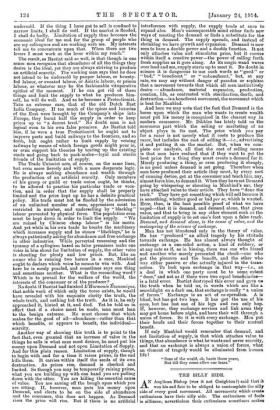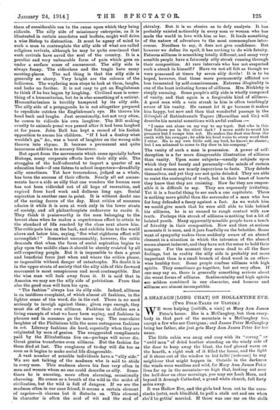THE SILLY SIDE.
AN Anglican Bishop (was it not Creighton ?) said that it was his sad fate to be obliged to contemplate the silly side of every good movement. All movements which create enthusiasm have their silly side. The enthusiasm of fools is silliness; nevertheless their enthusiasm sometimes makes
them of considerable use to the cause upon which they bring ridicule. The silly side of missionary enterprise, as it is illustrated in certain anecdotes and leaflets, might well drive a wise Bishop to distraction. It must be agony of mind to such a man to contemplate the silly aide of what are called religious revivals, although he may be quite convinced that such revivals have saved the soul of the country. It is a peculiar and very unbearable form of pain which goes on under a surface sense of amusement. The silly side is always funny. The ridiculous and the tragic have many meeting-places. The sad thing is that the silly side is generally so showy. Very bright are the colours of the ludicrous. The wayfaring man stops to look at them, laughs, and looks no further. It is not easy to get an Englishman to think if he has begun by laughing. Civilized man is some- thing of a humanitarian, but he is also something of a satirist. Humanitarianism is terribly hampered by its silly side. The silly side of a propaganda he is not altogether prepared to repudiate catches the Englishman's eye. He throws his head back and laughs. Just occasionally, but not very often, he comes to ridicule his own laughter. The Bill making cruelty to animals penal was passed after it had been laughed at for years. John Bull has kept a record of his foolish opposition to amuse his children. "If I had a donkey what wouldn't go," &c., was a burst of laughter on the wrong side thrown into rhyme. It became a permanent and quite innocuous addition to nursery literature.
But apart from the movements which come specially before Bishops, many corporate efforts have their silly side. The struggles of the half-educated to impart a quarter of an education look—if one listens to school inspectors—dreadfully silly sometimes. Yet how tremendous, judged as a whole, has been the success of their efforts. Nearly all set amuse- ments have a side so silly that one wonders the human race has not been ridiculed out of all hope of recreation, and expired from bard work and dullness long ago. Social aspiration is another case in point. It is without doubt one of the saving forces of the day. Most critics of manners admire it while it is seen at work only in the lower strata of society, and all philanthropists endeavour to excite it. They think it praiseworthy in the man belonging to the lowest class when he makes a superhuman effort to attain to the standard of life reached by the class next above him. The critiepats Lim on the back, and exhibits him to the world above and below him, saying, 'See what righteous effort will accomplish ! " Somewhat unreasonably, however, the critic demands that when the force of social aspiration begins to play upon the middle class it should be sternly resisted by all self-respecting people. But it is impossible to dam a great and beneficial force just when and where the critics please, or impossible without danger of catastrophe. No doubt it is in the upper strata of society that the silly side of this forward movement is most conspicuous and most contemptible. Bat the wise man will look away from it. It is said that in America we may see the silly side of patriotism. From that also the good man will turn his eyes.
"The fashion" always has its silly side. Indeed, silliness is an insidious complaint, of which almost all fashions, in the lighter sense of the word, dio in the end. There is no need seriously to inveigh against them; given rope enough, they must die of their own silliness. Fashions in clothes are a living example of what we have been saying, and fashions in phrases and in manners go the same way. The convulsive laughter of the Philistines kills the more outrageous fashions in art. Literary fashions die hard, especially when they are originated by men of genius. The exaggerated compliments paid by the Elizabethans live on—perhaps will never die. Great genius transforms even silliness. But the fashion for them died at last. The roughness of to-day will die too as soon as it begins to make social life disagreeable.
.A. vast number of sensible individuals have a "silly side." We are not talking of the madman who is said to abide in every man. This madman shows his face very often in men and women whom no one could describe as silly. Some- times he is amusing, more often alarming, occasionally charming. He comes as a breath of the wild in the midst of civilization, but the wild is full of dangers. If we see the madman often in our sane friend, it means a certain element of caprice—it charms but it disturbs us. This element in character - is often the soul of wit and the seed of
chivalry. But it is so elusive as to defy analysis. It has probably existed noticeably in every man or woman who has made the world in love with him or her. It lends something of the nature of adventure to the most commonplace inter- course. Needless to say, it does not give confidence. But however we define its spell, it has nothing to do with fatuity. Fatuous silliness is something totally different, and many very sensible people have a fatuously silly streak running through their composition. At rare intervals who has not suspected such a streak in himself P Have we not all felt as though we were possessed at times by seven silly devils ! It is to be hoped, however, that those more permanently afflicted are lees tormented by self-consciousness. Extreme illogicality is one of the least irritating forma of silliness. Mrs. Nickleby is simply amusing. Some people's silly side is wholly composed of vanity, and that again is a forgivable kind of silliness. A good man with a vain streak in him is often touchingly aware of his vanity. He cannot let it go because it makes him happy, but now and then that wonderful passage in the Giianjali of Rabindranath Tagore (Macmillan and Co.) will describe his mental sensations with awful realism "I came out alone on my way to my tryst. But who is this that follows me in the silent dark ? I move aside to avoid his presence but I escape him not. He makes the dust rise from tho earth with his swagger, he adds his loud voice to every word that I utter. He is my own little self, my lord, he knows no shame ; but I am ashamed to come to thy door in his company."
The vanity of such a man is possession. A power of self- deception is a far more disagreeable illustration of silliness than vanity. Upon some subjects—usually subjects upon which they feel keenly and personally—the minds of certain men and women are nearly impervious to facts. They delude themselves, and yet they are not quite deluded. They are able to resist the onslaughts of truth, but in their heart of hearts they know that they are resisting. How far they are respon- sible it is difficult to say. They are supremely irritating. Yet it is a fearful thing to see such a one capitulate. There is nothing more pitiful than the surrender of a man who has for long defended a fancy against a fact. As we watch him we would give much that he were still able to hide behind his silliness, he is so unused to rough contact with raw truth. Perhaps this streak of silliness is nothing but a bit of belated youth. Many apparently sensible people have a touch of frivolity in their composition. Now and then at serious moments it is seen, and it jars fearfully on the beholder. Some want of sympathy makes them suddenly aware of an absurd element in a situation in which the intrusion of the absurd seems almost indecent, and they have not the sense to hold their tongues. For the moment they seem dead to all the finer feelings, but in reality the silly side is probably not more important than is a small branch of dead wood in an other- wise healthy tree. Some people confuse silliness with high spirits. They sometimes go together, but not very often. If one may say so, there is generally something serious about the worst forms of silliness. Sentimentality and high spirits are seldom combined in one character, and humour and silliness are almost incompatible.







































 Previous page
Previous page